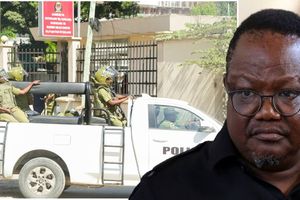Tanzanian files case questioning presidential term limit

Dar es Salaam. A city resident has filed a constitutional case with the High Court of Tanzania, questioning the legality of the presidential term limit in the country.
The respondent as per the case filed by Patrick Dezydelius Mgoya, who resides at Mbezi Beach in Dar es Salaam, is the Attorney General (AG).
The case was registered on August 30, 2019.
The plaintiff has filed the case under Section 4 of The Basic Rights and Duties Enforcement Act of 1994 in line with the Article 30 (3) of the Constitution of the United Republic of Tanzania of 1977.
The Constitutional Articles reads: “Any person claiming that any provision in this Part of this Chapter or in any law concerning his right or duty owed to him has been, is being or is likely to be violated by any person anywhere in the United Republic, may institute proceedings for redress in the High Court”.
In line with the provision, Mr Mgoya is questioning the legality of Article 40 (2) of the Constitution of the United Republic of Tanzania which provides for a term limit for one to occupy the office of the President of the United Republic.
Mr Mgoya has therefore asked the court to issue a declaration and an accurate interpretation and outline the impact of Article 40 (2) of the Constitution of the United Republic of Tanzania.
He is also asking the Court to issue the right and vivid legal interpretation of Article 42 (2) of the Constitution of the United Republic of Tanzania and how it (the Article) relates with Articles 13, 21 and 22 of the same mother law.
Article 13 speaks about the equality of people before the law while Article 21 is about citizens’ freedoms to participate in public affairs whereas Article 22 gives every citizen the right to work.
Mr Mgoya is asking the Court to give the right legal interpretation of Article 40 (2) of the Constitution of the United Republic of Tanzania in relation to Article 39 of the same legal piece.
Article 39 outlines the qualities for one to be elected President of the United Republic of Tanzania.
In his argument, Mr Mgoya contends that by setting a term limit, Article 40 (2) of the Constitution was going against constitutional provisions that empower citizens to exercise their rights and freedoms to taking part in public affairs.
Mr Mgoya’s case comes at a time when President John Magufuli has, on several occasions, said that he was not interested in extending of his presidential terms for even five minutes.
In April this year (2019) President Magufuli reiterated his position against extending his rule beyond the constitutional limit.
“My position as president is temporary and once my tenure ends, I will leave on the very same day,” he told a public rally in Newala, Mtwara Region, adding that he will never be tempted to stay an extra day in office after his mandate in office ends.
Amid calls from some of his party members while on a trip to Tanga, President Magufuli said in August, 2017: “I have taken oath to defend the constitution. I shall play my part and pass on the leadership reins to the next Head of State when the time comes.”




